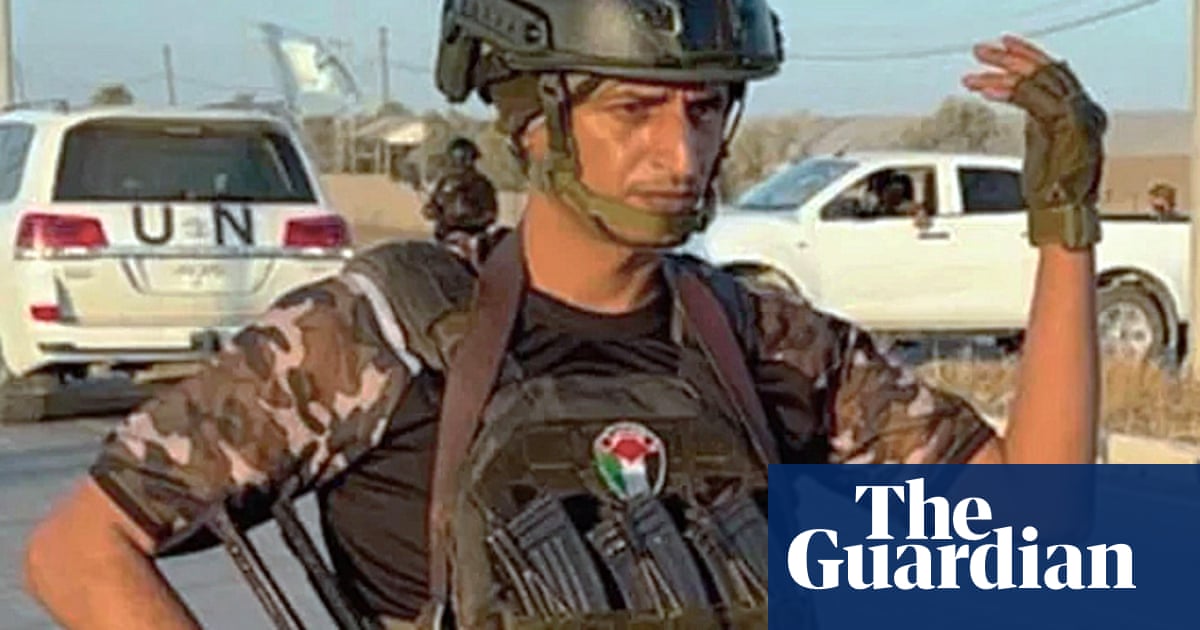On 7 October 2023, Yasser abu Shabab was languishing in a Hamas-run jail inGazaon charges of drug trafficking. With the outbreak of the conflict, the Palestinian from Rafah managed to leave prison, though the circumstances of his release remain unclear to this day.
For a while, Abu Shabab vanished from sight. That changed last week when Israeli defence officials acknowledged they had begun arming a clan that calls itself the Anti-Terror Service. It consists of about 100 armed men who operate in eastern Rafah under the command of Abu Shabab, whose nickname is “the Israeli agent” and who is described as a “traitor” on social media in the territory.
The officials said the Israel Defense Forces’ goal was “reducing Israeli military casualties” while systematically undermining Hamas. But critics have warned that the Israeli-backed criminal gang could push Gaza to the brink of civil war.
Abu Shabab, 32, has emerged as a powerful figure, exerting control over aid routes near the strategically vital Kerem Shalom crossing, while members of his group are accused of looting trucks carrying food, and of having ties to jihadist groups.
Last month Jonathan Whittall, the head of the United Nations Office for the Coordination of Humanitarian Affairs (OCHA) in occupied Palestinian territories, said: “Theft of aid since the beginning of the war has been carried out by criminal gangs,under the watch of Israeli forces, and they were allowed to operate in proximity to the Kerem Shalom crossing point into Gaza.”
When contacted by the Guardian, Whittall said he was “referring to gangs such as Abu Shabab”.
In a written interview with the Guardian, Abu Shabab blamed Hamas for the war in Gaza, defended himself from the accusations of looting and insisted his clan was providing security to aid trucks passing from the Kerem Shalom crossing into Gaza.
“My activities are humanitarian and it’s for my people only,” Abu Shabab said. “We are providing security in areas controlled by our national forces and providing support to hundreds of families, with hundreds of people flocking to our areas every day.”
Several videos circulating on social mediain Gaza from his Facebook profile, verified by the Guardian with his associates, show members of Abu Shabab’s group operating alongside Israeli soldiers in IDF-controlled areas in southern Gaza.
Asked if his group was acting in coordination with Israeli forces, Abu Shabab said: “We do not work directly with the Israeli army.”
The Times of Israel cited defence sources who said Israel had provided members of Abu Shabab’s faction with Kalashnikov assault rifles, including some weapons seized from Hamas.
Since Israel eased its blockade on aid to Gaza, dozens of lorries carrying food have been entering the territory each day, crossing through Kerem Shalom and moving towards Rafah, where Abu Shabab has set up a series of checkpoints.
A diplomatic official told CNN that theGaza Humanitarian Foundation(GHF), the new US-backed organisation tasked by Israel with distributing supplies in the territory, had contact with Abu Shabab, “whether directly or indirectly”.
Asked if he had a collaboration with the GHF, which is distributing food at three sites in Rafah, Abu Shabab declined to comment.
Reached by the Guardian, a spokesperson for GHF said: “We provide our own security and do not have any local security. Our trucks have never been protected by Abu Shabab or anyone else.”
Without providing any evidence supporting his claims, Abu Shabab – whose responses appeared contradictory and were often undermined by his previous statements or by verifiable evidence – blamed Hamas for looting trucks carrying food into Gaza.
“We do not take anything from the aid trucks,” said Abu Shabab, who did not respond to calls or texts but corresponded through an email address provided to international news outlets and confirmed by his associates. “Aid is stolen in areas controlled by Hamas.”
However, in an interview in November 2024with the New York Times, Abu Shabab admitted that his men had raided half a dozen aid trucks since the start of the war. “We are taking trucks so we can eat, not so we can sell,” he told the paper, saying he was feeding his family.
Since Abu Shabab’s name began appearing in the media, Hamas has publicly declared it is intent on killing him. Abu Shabab has reasons to loathe Hamas. The militant group killed his brother last year and has already tried to kill Abu Shabab at least twice.
“The war will not end as long as Hamas insists on its position,” Abu Shabab said.
On Wednesday the Israeli news channel i24reportedthat Israeli soldiers clashed with Hamas members in order to protect Abu Shabab from being killed, which resulted in deaths on both sides.
Although the Israeli prime minister, Benjamin Netanyahu, did not name Abu Shabab, he has admitted to having “activated” clans in Gaza that he says oppose Hamas.
Netanyahu’s comments sparked a row in Israel, with opposition leadersaccusing the governmentof transferring weapons to a group of thugs and criminals “who identify with [Islamic State]”.
Abu Shabab’s links with Israeli forces were confirmed by his family, which issued a statement last week formally disowning him. “We will not accept Yasser’s return to the family. We have no objection to those around him liquidating him immediately,” they said.
The rise of Abu Shabab as the first openly acknowledged Palestinian collaborator with Israeli forces since the start of the Gaza war could, according to many analysts, ignite a dangerous new phase of the conflict.
In addition to clashes with Hamas, his clan may soon face violent confrontations with rival gangs and members of Gaza’s popular committees,Israeli media report.
They say it is the kind of environment where civil wars often take root – and where civilians, once again, are likely to bear the heaviest cost.
